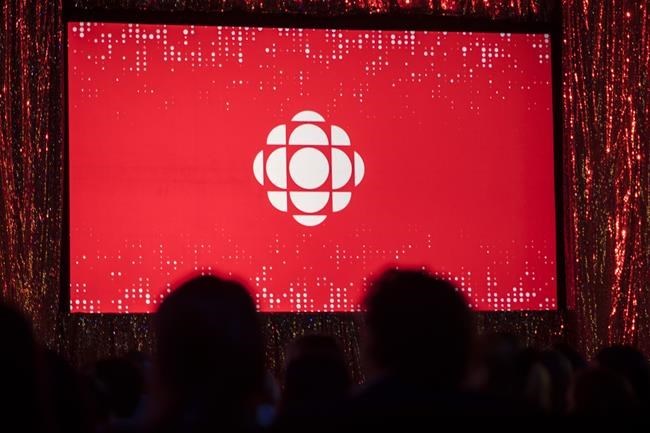
The Opposition party is attempting to have a House of Commons committee study an editorial decision of the Canadian Broadcasting Corp. despite its independence from the government being enshrined in law. The CBC logo is projected onto a screen in Toronto on May 29, 2019. THE CANADIAN PRESS/Tijana Martin
Republished October 17, 2023 - 3:19 PM
Original Publication Date October 17, 2023 - 12:46 PM
OTTAWA - The official Opposition tried to have a House of Commons committee study an editorial decision of the Canadian Broadcasting Corp. on Tuesday, despite its independence from the government being enshrined in law.
Conservative deputy leader Melissa Lantsman introduced a motion on Tuesday to summon the head of CBC and its director of journalistic standards to testify over the broadcaster's policy not to call Hamas militants "terrorists" in its coverage of the Israel-Hamas war.
The CBC is defending the policy. It says it uses the words "terrorist" or "terrorism" when they are attributed to someone, but it is asking reporters to avoid using the terms in their own voice because they are loaded with meaning, politics and emotion that can impede their journalism.
The Associated Press, BBC and other news organizations around the world follow similar practices.
Paul Knox, a professor emeritus at the Toronto Metropolitan University school of journalism, said he believes the Tories' motion is unprecedented — and "out of line."
"The idea that you could come in and try to use your power of subpoena to go over with a fine-tooth comb what reporters were reporting, writing and broadcasting, and what editors' policies are, is really repugnant to the whole idea of freedom of press," said Knox.
In Canada, journalistic speech is protected under Canada's Charter of Rights and Freedoms, Knox said, and there are very few exemptions, such as libel and defamation laws, that limit what journalists can say or write.
CBC/Radio-Canada's independence from government and Parliament is also protected by the Broadcasting Act, said Leon Mar, its director of media relations.
"Nobody in any official capacity ought to be trying to circumscribe that other than by law, and they would have to have very good reasons," said Knox.
Liberal, NDP and Bloc MPs at the public accounts committee voted in favour of adjourning debate on the motion, saying the committee doesn't deal with such matters. They raised concerns that Conservatives are looking for CBC to become state media.
Following the meeting, Lantsman said she was disappointed that the other parties had shut down the debate.
"It has been policy of the Canadian government for over 20 years to call Hamas what they are: terrorists," said Lantsman.
"And if the public broadcaster can't do it, then I'm not sure Canadian tax dollars should be funding it."
CBC News editor-in-chief Brodie Fenlon said in a blog post Monday that its editorial policy "has nothing to do with Hamas or Israel, and nothing to do with the intensity of suffering and horror we saw last week."
He noted that CBC's coverage has multiple references to terrorism.
"We bear witness. But CBC News does not itself designate specific groups as terrorists," he wrote.
The Canadian Press Stylebook, a writing and editing guide used widely by those working in media, communications and publishing, notes there has been disagreement over the definition of terrorism.
"We do not shy away from the word terrorist, but we do use it with caution," says the guide, which encourages the use of more neutral and specific words.
The Canadian Press, a national wire service that provides content to media clients across the country, has also been noting in stories that Canada considers Hamas to be a terrorist organization, which has been the case since 2002.
The Associated Press Stylebook similarly advises caution and recommends attributing the words to authorities.
Similar debates occurred across newsrooms following the Sept. 11 attacks, said Knox.
He said editors have to take in context to make decisions and they "have to be very careful."
Despite the Tories' motion failing, Knox said it shouldn't go unnoticed, and the public shouldn't allow politicians to stray into territory where they shouldn't be.
"It's really offside for politicians to be questioning the judgment of journalists in terms of language in news stories," he said.
"Particularly where the implication is that it's going to be a relevant factor in their votes and decisions about funding the public broadcaster."
Canadian Heritage Minister Pascale St-Onge said the Tories' motion demonstrates that they don't understand how the law works, and they don't understand what journalistic independence is.
Mar said Canadians that have concerns about CBC/Radio-Canada's journalism can write to the broadcaster's independent ombudsman, who investigates complaints and publishes results publicly.
"At this moment, a number of our journalists are on the ground in Israel and in Gaza. They are risking their safety in order to tell Canadians what is happening there," said Mar.
"They are the very best at what they do, and the quality and accuracy of their journalism stands among the best in the world."
This report by The Canadian Press was first published Oct. 17, 2023.
News from © The Canadian Press, 2023